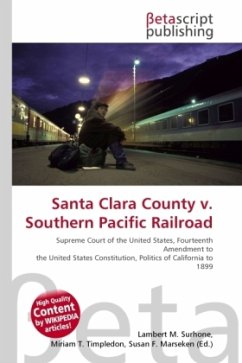
Santa Clara County v. Southern Pacific Railroad
Versandkostenfrei!
Versandfertig in 6-10 Tagen
23,99 €
inkl. MwSt.

PAYBACK Punkte
12 °P sammeln!
High Quality Content by WIKIPEDIA articles! Santa Clara County v. Southern Pacific Railroad Company, 118 U.S. 394 (1886) was a United States Supreme Court case dealing with taxation of railroad properties. The case is most notable for the obiter dictum statement that corporations are entitled to protection under the Fourteenth Amendment. San Mateo County, along with neighboring counties, filed suit against the railroads to recoup the massive losses in tax revenue stemming from Southern Pacific's refusal to pay. After hearing arguments in San Mateo County v. Southern Pacific Railroad Company, t...
High Quality Content by WIKIPEDIA articles! Santa Clara County v. Southern Pacific Railroad Company, 118 U.S. 394 (1886) was a United States Supreme Court case dealing with taxation of railroad properties. The case is most notable for the obiter dictum statement that corporations are entitled to protection under the Fourteenth Amendment. San Mateo County, along with neighboring counties, filed suit against the railroads to recoup the massive losses in tax revenue stemming from Southern Pacific's refusal to pay. After hearing arguments in San Mateo County v. Southern Pacific Railroad Company, the California Supreme Court sided with the county. Using the Jurisdiction and Removal Act of 1875, a law created so black litigants could bypass hostile southern state courts if they were denied justice, Southern Pacific was able to appeal all the way to the U.S. Supreme Court.












